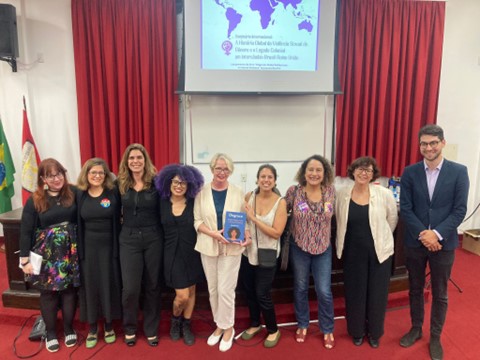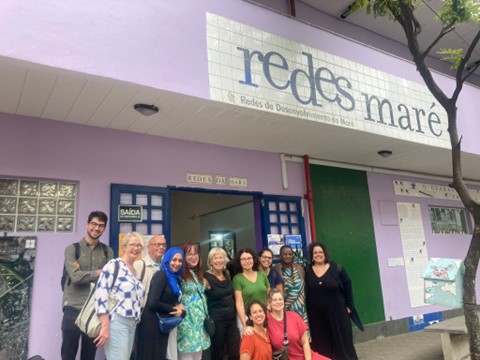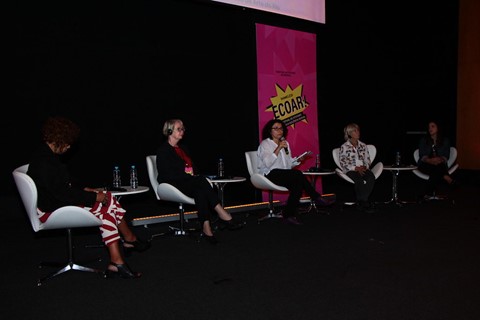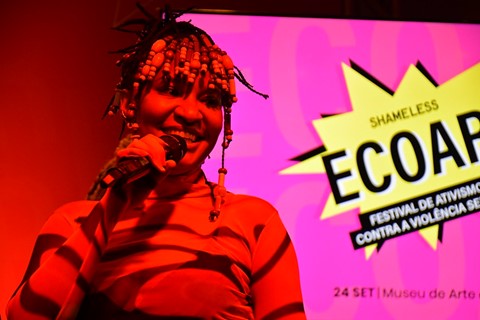On 24 September, Ecoar!, the second Shameless! Festival of Activism Against Sexual Violence took place in Rio de Janeiro, Brazil. The culmination of several years of partnership work between the SHaME project, the WOW Foundation, and Redes da Maré, the vibrant one-day festival brought together creatives, researchers, activists, front-line practitioners, and members of the public, to harness the shared power of art, activism, and academic research in dismantling the shame and stigma so often attached to experiences and disclosures of sexual violence. Seeking to empower survivors in their healing, and to provide a call to action for urgent changes to professional practice and policy around abuse, the festival aimed to create a space to share perspectives and build ongoing collaborations.
In preparation for the festival, members of the SHaME team (SHaME Director Professor Joanna Bourke, and Postdoctoral Research Fellows Dr Rhian Keyse and Dr George Severs) travelled to Rio de Janeiro, to take part in a series of activities aimed at building understanding and collaboration between the partner organizations involved in Ecoar! On our first day in Rio, we were privileged to speak at an international seminar with Brazilian academic colleagues at the Universidade Federal do Rio de Janeiro, entitled ‘A História Global da Violência Sexual de Gênero e o Legado Colonial: um intercâmbio Brasil-Reino Unido’ (The Global History of Gendered Sexual Violence and the Colonial Legacy: A Brazil-United Kingdom Exchange). Panelists’ contributions were diverse, covering a range of issues including the current political situation in Brazil and its implications for bodily autonomy, sexual violence in the recent Kenyan elections, and the experiences of men as survivors of sexual violence in both Brazil and the United Kingdom. This seminar was followed by the launch of Professor Joanna Bourke’s new book, Disgrace, which included a reading from the book and an inspiring conversation between Joanna and Juliana Neuenschwander, Professor of Law at the Federal University of Rio de Janeiro.

On the following day, at the invitation of our partner organization Redes da Maré, we travelled to visit the Complexo da Maré, a neighbourhood made up of 16 favelas in the north of Rio de Janeiro which is home to more than 140,000 people. We were humbled by the opportunity to meet our colleagues from Redes, and to learn more about the work they do as a grassroots and community-led organization to improve the quality of life of, and guarantee the rights of, residents of Maré. We visited projects supporting residents with education, sexual health, LGBTQI+ rights, substance use issues, homelessness, and women’s rights, where workers and residents were generous in sharing their work and their experiences. We were also guests at the opening night of Fúria, a dance performance by the Lia Rodrigues Companhia de Danças, a dance company based in Maré which has performed at venues in many countries.

With an early start on Saturday 24 September, we arrived at the beautiful setting of the Museu de Arte do Rio for Ecoar! Alongside 1,600 members of the public, we attended the opening of the festival where Joanna Bourke kicked off proceedings alongside Eliana Sousa Silva (founder of Redes da Maré and author of Maré Testimonies), Jude Kelly (founder of the WOW Foundation), Mônica Sacramento (Project Coordinator of Criola, a civil society organization celebrating 30 years of work in defending and promoting the rights of Black women in Brazilian society), and Sandra Sérgio, Executive Director of the Museu. The festival brought together diverse perspectives from activists, researchers, writers, artists, and frontline practitioners working to challenge sexual violence.

A panel on male survivors of sexual violence featured SHaME postdoc George Severs alongside three Brazilian academics. A diverse conversation brought in psychological, psychoanalytic and historical perspectives. Members of the SHaME team found Denis Ferreira’s paper particularly grounding. His trailblazing research has involved a detailed analysis of the ‘Male Memories’ project which surveyed over a thousand male survivors of sexual violence across Brazil. This analysis was able to counter some prevailing myths about male rape in Brazil, clarifying that this is an issue facing men across the country (not simply in metropolitan centres), and with more regularity than previously imagined. Such research chimed with the historical psychiatric studies which had helped to make male survivors more visible in Britian in the 1990s, which George discussed in his paper. SHaME looks forward to hearing more about Ferreira’s work when we host him in London later this month.

Dr Rhian Keyse spoke on a panel exploring sexual violence against women in urban contexts, alongside Ana Paula Pinto Damasceno, a Brazilian expert on gender-based violence, Dayana Gusmão, a social worker and a founding member of the Coletiva Resistência Lésbica da Maré (Lesbian Resistance Collective of Maré), and Adriana Santos, a social worker and specialist in gender-based violence, who works for the Universidade Federal do Rio de Janeiro at the Reference Center for Women Suely Souza de Almeida (CRM-SSA), where she is also project coordinator. The discussion was wide-ranging, exploring topics such as politically-motivated sexual violence in Kenya and in Brazil, so-called “corrective” rape of LGBTQI+ people in peripheral communities, and the impact of colonial histories in creating environments where sexual violence is prevalent, as well as the importance of solidarities within and between communities in confronting sexual violence.
The session entitled “Exchange of Experiences: Let’s Talk” was a conversation between scholars from different regions of the world, questioning the normalization of violence throughout history and how feminists and survivors have fought against abusive institutions, ideologies, and practices. The discussants – Professor Joanna Bourke (Director of the SHaME project at Birkbeck, University of London and Dr Carla de Castro Gomes (a postdoctoral Fellow at the State University of Campinas) — talked about their work. Carla is a sociologist who works on feminist movements and abortion politics. Her interests are in the social impacts of the criminialization of abortion and policies aimed at combating violence. This resonated with Joanna’s research. Joanna introduced her new book, entitled Disgrace and spoke about her main arguments, concluding with a discussion on creating rape-free worlds.
The festival ended on a celebratory note, with a performance from the Latin Grammy Award nominated singer-songwriter, actress, presenter, poet, and music producer Larissa Luz, whose music melds together influences from Brazil, Jamaica, and the African continent, and is inspired by a range of genres including rap and rock.

After the celebratory atmosphere of Ecoar!, we were devastated to learn from our colleagues at Redes that, just two days later, Maré residents were surprised with a heavy police operation in the early hours of the morning, in which seven residents were killed, and schools and health centres providing services to the community were closed, and other violations of residents’ rights occurred. We condemn this state violence and stand in solidarity with the residents of Maré. To amplify the words of our colleagues at Redes, “without justice, there can be no democracy”. With Brazil at a pivotal political moment following the election of Luiz Inácio Lula da Silva, and the promise of more progressive politics in 2023, we hope for peace and justice for the residents of Maré, and for all marginalized communities.
To support the work of Redes da Maré, you can donate here.
 Dr Rhian Keyse is a postdoctoral researcher on the SHaME project. She is a social and cultural historian of gender in modern Africa. Her doctoral research examined international, imperial, and local responses to forced and early marriage in British colonial Africa. Her current project examines the histories of medico-legal responses to sexual violence in (post)colonial Anglophone Africa, c.1920-1985, with a particular focus on Ghana and Kenya. Prior to joining the project, Rhian worked in the gender-based violence sector, most recently providing trauma support to homeless women with experiences of sexual violence.
Dr Rhian Keyse is a postdoctoral researcher on the SHaME project. She is a social and cultural historian of gender in modern Africa. Her doctoral research examined international, imperial, and local responses to forced and early marriage in British colonial Africa. Her current project examines the histories of medico-legal responses to sexual violence in (post)colonial Anglophone Africa, c.1920-1985, with a particular focus on Ghana and Kenya. Prior to joining the project, Rhian worked in the gender-based violence sector, most recently providing trauma support to homeless women with experiences of sexual violence.